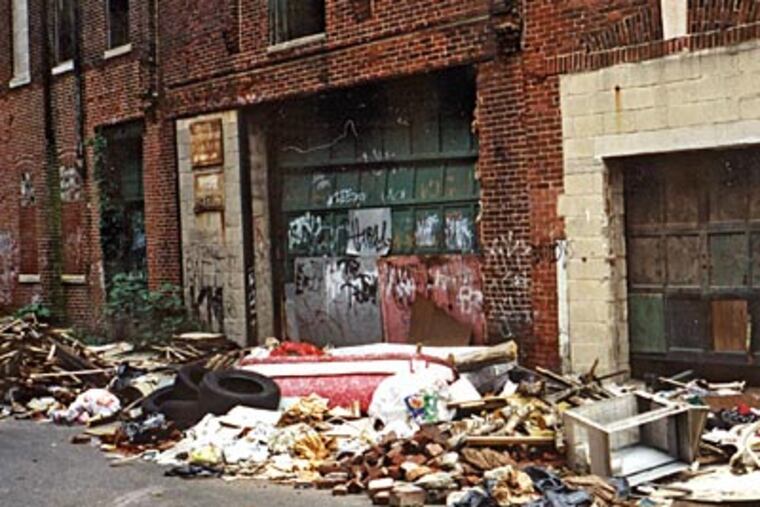Time expiring on $45M to eradicate Phila. blight
The clock is ticking loudly at City Hall, and if the Nutter administration and City Council do not move fast, Philadelphia could lose $45 million to fight blight.

The clock is ticking loudly at City Hall, and if the Nutter administration and City Council do not move fast, Philadelphia could lose $45 million to fight blight.
The money with the Cinderella deadline is the last of the bond proceeds for the city's Neighborhood Transformation Initiative, an expensive crusade that former Mayor John F. Street launched nearly a decade ago to demolish abandoned buildings and acquire vacant property.
Of the $296 million raised since 2001 for NTI, this last pot of money has the most strings attached. It may go only to certain hard-pressed neighborhoods - including parts of Germantown, North Philadelphia, Point Breeze, and West Philadelphia - that are specially designated for redevelopment.
The trouble is, it has to be spent by March 2011.
City Hall feels the pressure.
"It's going to be a daunting task to spend it all in the time frame we have left," said Clarence Armbrister, who as Mayor Nutter's chief of staff has been given oversight of NTI.
City Controller Alan Butkovitz said that given how long it takes to condemn and acquire a property, the city "could run into a wall" on the way to allocating all the money. And "in a city where dollars are hard to come by," he added, "it would be a sin not to avail ourselves of dollars that have already been borrowed."
How the city got into this squeeze is part of the ongoing saga of the vaunted NTI program.
When Street launched it in 2001, he had two main goals: to raze derelict houses and to recycle unused land into affordable housing, job-generating economic projects, or residential yards.
Most of the NTI budget went toward demolishing dilapidated homes ($136 million); land acquisition accounted for the next biggest slice ($72 million).
The process went like this: Recommendations for vacant properties to acquire came from City Council and the mayor's office. Council members worked with developers, nonprofit builders, or businesses that needed land in their districts. The more blight a district had, the bigger its slice of NTI funds.
The Redevelopment Authority (RDA) then condemned the parcels, paid a fair-market rate to the owners, and handled other legalities, including covering overdue taxes and liens.
But NTI missed its marks. The city fell far short of its goal for demolishing abandoned buildings, while the system for handling land acquisitions was overwhelmed.
The RDA spent tens of millions of dollars in 144 actions to condemn and acquire 3,500 parcels. But when Nutter took office in 2008, no one knew precisely how much had been spent or where.
At the request of the mayor and City Council, the Controller's Office began an audit in June 2008. With that, all spending came to a halt.
Last October, the Controller's Office issued a scathing criticism of the RDA's handling of NTI funds during the Street administration. In a report as thick as a phone directory, auditors concluded that the bulk of the remaining money was the most-restrictive bond revenue, totaling $45 million.
After a two-year delay, City Council members now have to work with the Office of Housing and Community Development to review the list of properties they want to acquire with their NTI allotments. The mayor, too, has an equal amount to allocate and will make his own requests.
A team from the Mayor's Office, RDA, and OHCD then will decide which deals to fund, and whether they comply with the restrictions of the remaining funds.
"There are lots of steps" to the condemnation process, said Terry Gillen, executive director of the RDA. "We have to decide at the RDA if we can crank that much property through the system in one year."
Council members know time is running out.
Councilwoman Maria Quiñones Sánchez, of the Seventh District, which includes much of Kensington, has a list of affordable-housing projects in her district that want to tap into NTI funding to acquire land. The area is pockmarked with vacant land, and a portion of it, she said, lies in a qualified zone for spending NTI bond funds.
"We're ready," Sánchez said. "I have about 10 projects in the pipeline. The mayor needs to release the funds and let us move forward."
And if all the money is not spent by next March? The city would have to put the funds into an escrow account until it has to start paying off bondholders.